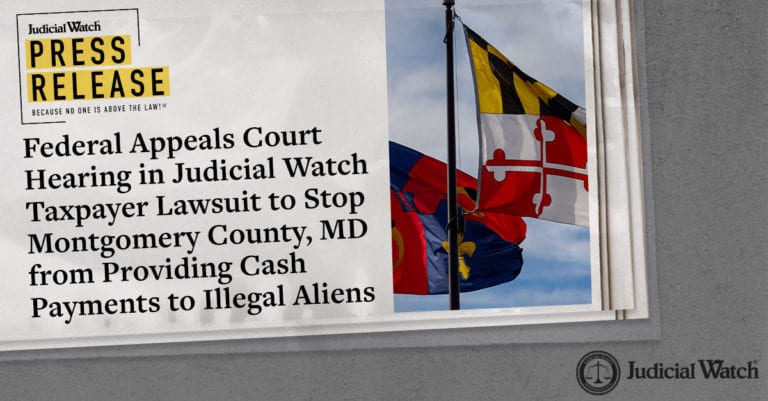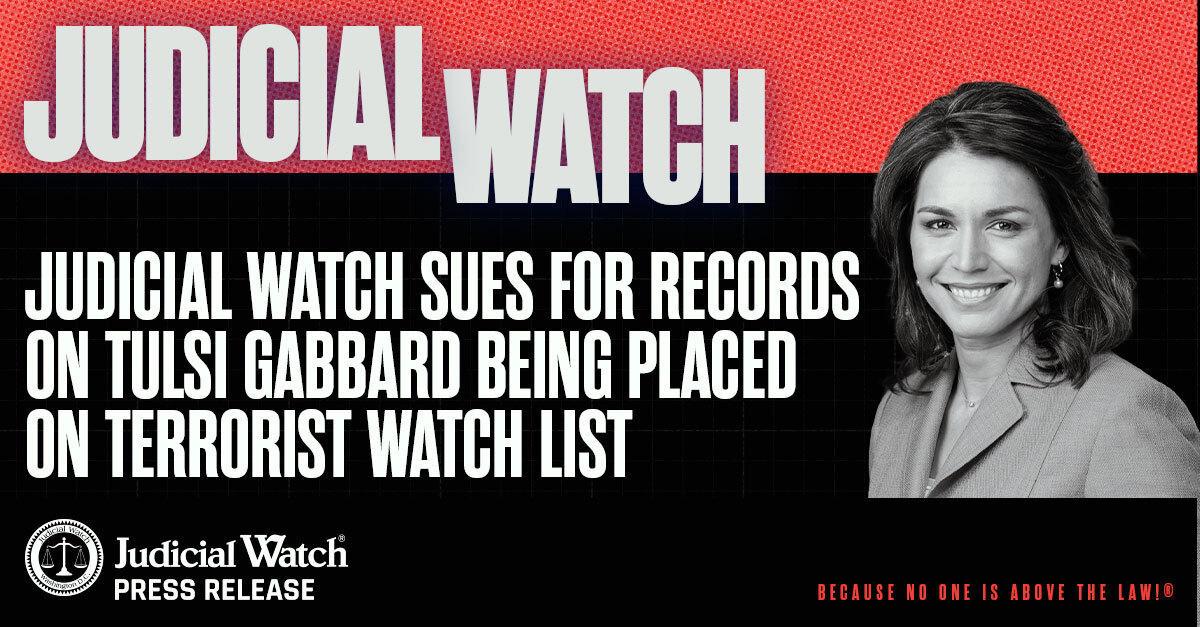

Federal Appeals Court Hearing in Judicial Watch Taxpayer Lawsuit to Stop Montgomery County, MD, from Providing Cash Payments to Illegal Aliens


(Washington, DC) – Judicial Watch announced today that on May 5, 2021, the U.S. Court of Appeals for the Fourth Circuit will hear Judicial Watch’s lawsuit (Bauer, et al. v. Elrich, et al. (No. 20-1707)) challenging the legality of the Montgomery County, Maryland program that provides cash payments to illegal aliens. Judicial Watch argues on behalf of Montgomery County taxpayers Sharon Bauer and Richard Jurgena that the county’s program providing $10 million in cash benefits to illegal aliens violates federal law and irreparably harms county taxpayers.
Date: May 5, 2021
Time: 9:30 a.m. ET
Place: The public can access the argument here: https://www.ca4.uscourts.gov/cal/internetcalmay032021ric.pdf
This hearing arises from the original complaint (Bauer et al. v. Elrich et al. (No. 482061V)) filed on May 8, 2020, in Montgomery County Circuit Court, which Montgomery County Executive Marc Elrich and Raymond Crowel, director of the county’s Department of Health and Human Services, subsequently removed to federal court. The lawsuit seeks to permanently enjoin Elrich and Crowel from expending taxpayer money on the cash-benefits program known as the “Emergency Assistance Relief Payment Program” (EARP).
Under federal law, certain categories of aliens, including illegal aliens, are ineligible for state or local public benefits. Such benefits include direct, cash payments. If a state chooses to provide such benefits to illegal aliens, it must enact a state law affirmatively providing for such eligibility.
On May 29, 2020, the District Court ruled the program likely violates federal law and irreparably harms county taxpayers. The court ordered the county to hold back 25% of any unspent funds until the court could fully consider the merits of Judicial Watch’s taxpayer lawsuit. Later, the District Court dismissed the case, concluding it did not have jurisdiction to hear the case.
The Department of Justice filed an amicus brief in the appeal brought by Judicial Watch in which the agency agrees the policy is illegal but suggests state taxpayers have no right to sue state officials to stop them from using taxpayer funds to violate federal law.
Judicial Watch explains in its appeal: “The issues before this Court concern what cases federal courts may hear, whether state causes of action may rely on violations of federal law, and whether county officials acted illegally.” Also, pointing to 8 U.S. Code § 1621:
In short, Section 1621 prohibits unlawfully present aliens from receiving state and local public benefits unless the state legislature affirmatively authorizes it.
Even though the Maryland legislature had not affirmatively authorized it, Montgomery County, Maryland, nonetheless, started providing cash payments to unlawfully present aliens. As part of its response to the COVID-19 pandemic, the Montgomery County Council appropriated $10 million for an Emergency Assistance Relief Payment (“EARP”) program…. EARP provides cash payments to individuals or families, including unlawfully present aliens … who (1) live in Montgomery County, (2) are not eligible for federal COVID-19 stimulus checks or state benefits, (3) are not eligible to receive unemployment benefits, and (4) have an income equal to or below 50% of the federal poverty level…. The County Department of Health and Human Services (“DHHS”), which administers the program, distributes payments of $500 to eligible single adults, $1,000 to eligible families with a child, and an additional $150 to families for each additional child, up to $1,450 total….
Seeing their taxes being spent in violation of federal law, Sharon Bauer and Richard Jurgena (“Taxpayers”), Montgomery County taxpayers, sought to enjoin County Executive Marc Elrich and DHHS Director Raymond Crowel (collectively “Montgomery County”) from implementing EARP.
“Politicians in Maryland are using COVID as an excuse to violate the law. If they want to give cash payments to illegal aliens, they must be accountable and transparent, and, as federal law requires, pass a state law to do so,” stated Judicial Watch President Tom Fitton.
###















